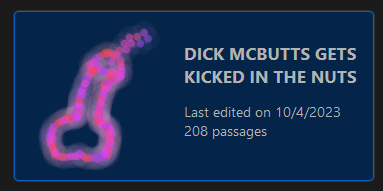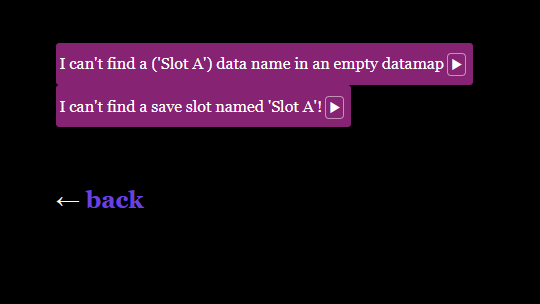Virtue by Oliver Revolta
Entry
Virtue is a short-ish linear entry, where you follow Gloria, a newly middle-class woman on a self-righteous path to prove her standing in her new community. It is meant as a satire about the origin story of a conservative member of parliament in Britain.
It should be noted that while the blurb sort of spoils the gist of the game, the original content warnings are not clear enough on the actual content of the entry. Please note that there are mention of an assault of a child, as well as xenophobic comments in the game. It was genuinely upsetting to read through some parts, unwarned.
Honestly, I am incredibly conflicted about this entry, because it is clear what the author was trying to make fun of, but the results is undermined by issues (see last point). A shame the ending is spoiled in the blurb, it would have made the revelation stronger…
On the surface, the entry does a decent job at make a jab at those conservative pundits, how they got where they are now, how conservative talking points are sometimes hypocritical, or downright dangerous, or how comically easy people can fall into extremism. It touches on what you’d expect, and makes clear who you are supposed to like or not.
But when you dig deeper, the entry feels a bit shallow. While meant to be off-putting and shocking, the text barely dives into the tory-ism and more extreme talking points. I was expecting Gloria’s decent into her “moralistic” path to be more explicit in both her views and her spoken words, but she barely go further than what you’d see a light “Karen” do*. She is much too restraint to make the satire work in that regard (even with the British “politeness” coming into play).
*sorry for all the decent Karens out there…
Speaking of Gloria, it is obvious from the start she is not meant to be liked. She is a vapid busy-body woman who has nothing better to do than keep up with appearances. Like your usual stereotypical middle-class stay-at-home mother, she berates her husband to no end, disregard her daughter (which I felt she even envied), and, in some sort of Oedipal concept, puts her son on a small pedestal… that is when she actually pay attention to her family. She seems more interested in her little dog than anyone else. To further the point of how sad and empty this woman’s live actually is, the game shows a clear lack of hobbies and passion by the end of the game.
With Gloria putting so much importance in appearance and status, coupled with her lack of personal life, it is no wonder she’d end up where she did. And it works for the game! Who doesn’t like a comically evil (or maybe stupid) character.
Finally, a bit of the elephant in the room. [See point below]
Mention of assault moving forward
The whole tragic backstory of Gloria having been assaulted in her childhood, used later on as an angle for moral and sexual purity, was not just uncomfortable to read (especially the implication that it helped pushing her down that path), but downright unnecessary and unimaginative. There are enough content out there using the rape trope as a backstory, and coupled with the “self-indulgence” satire, it leaves a bad taste in the mouth. The whole ‘you’re dirty’ angle played almost for laugh is genuinely upsetting, as the need of wanting to be clean is an actual trauma response following an assault. The carelessness in this, especially when the content warnings are lacking in that regard, really sours the game.
And there were other directions the author could have taken to use the whole clean/dirty bit. Gloria came from council houses, aka poverty, aka was a dirty poor. But now, she lives in a middle class house. She is not dirty anymore, she is a proper not-poor person. She has worth. She turns her back on where she comes from because that’s shameful and dirty, and she is a proud and clean woman.
And that’s it. No need for the cheap assault trick. Instead of undermining the point of the satire, it pushes the hypocrisy angle of conservative points.
![]() . Maybe the use of the imperative form instead would work better?
. Maybe the use of the imperative form instead would work better? ![]()
![]()

